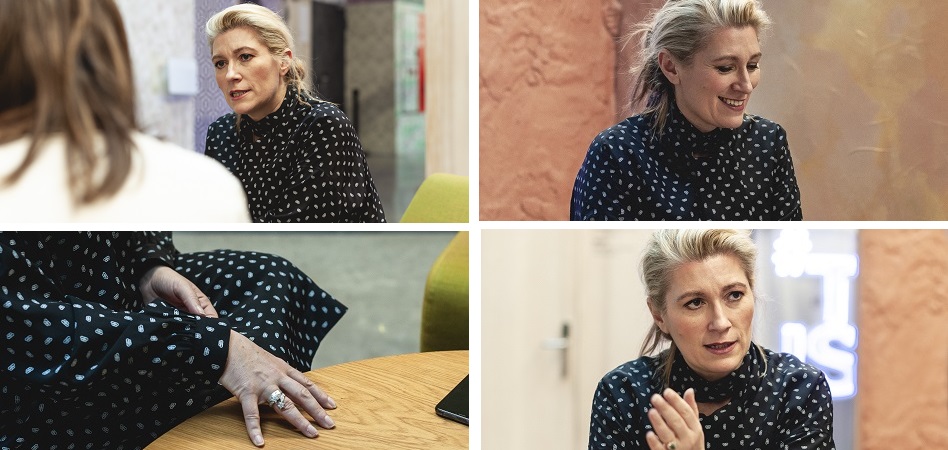Marie-Claire Daveu (Kering): “Being sustainable is a necessity if you want to continue to do your business”
Daveu is Kering’s chief sustainability officer and head of international institutional affairs since 2012. She started her career working at the public sector, serving as chief of staff to French politician Nathalie Kosciusko-Morizet.
This is her second interview in a row after the one she did on the stage of Re-Barcelona. But Marie-Claire Daveu looks tireless when it comes to defending the sustainability strategy of the group she works for, Kering. Unmistakably French (the accent betrays her from her first greeting), Daveau started her career working at the public sector as chief of staff to French politician Nathalie Kosciusko-Morizet. In 2012, she joined Kering, one of the pioneers in creating an environmental P&L.
Mds: How would you define sustainability?
Marie Claire Daveu: I will take the classic old definition: how you combine the fact that you can earn some money and have an economic development and, at the same time, to pay attention to people and to the planet.
Mds: You were the first luxury company to create an environmental P&L. Is being sustainable profitable?
MCD: When we developed our e-P&L it was really a way to measure our environmental footprint. Because we know that if we don’t have a clear measurement of where our impacts are we would not be able to put in place a robust policy on your environmental side. After all, we want to combine with the business side our E P&L, it’s very useful for our CEOs, because they can have their classic old P&L, they can use the e-P&L, and at the same time they can identify which kind of investment they can do that is the most efficient from the environmental side and also has the most efficient impact on the classic old P&L.
Mds: How do you combine both?
MCD: Having a sustainable approach is not only important for ethics reasons but also for business reasons. Most of our raw materials are coming directly from nature. And when you make the link with the most important issue of our century -climate change, lost of biodiversity and resource scarcity…- you understand quite easily that if you don’t pay attention to nature, to biodiversity and to climate change you won’t be able not only to be able to develop your business, but neither to continue to do your business. That’s why we feel that is really important to embed sustainability in our strategy.
“It was the right momentum to sign the Fashion Pact; now we have to deliver, we have to act”
Mds: So it’s actually about surviving?
MCD: We can say it like that, of course. When you use the word surviving is quite strong, but yes: as a company and as humanity.
Mds: That requires money and time as well. But you’re a public company. Investors have this patient?
MCD: We are a family listed company. For us, of course short term is important, but long term is also very important, because we are not only working for the next two years. Regarding investors and financial analysts, now more and more people in this sector are asking questions about sustainability. Because they’ve also understood that from a risk management approach is very important to see if the companies are tackling this kind of issue or not. And the most sustainable companies are also the most profitable companies. Because sustainability is of course about the environmental side but also about people, diversity, ethics… And finally, sustainability for us is not a cost, is an investment. You have to admit that the ROI won’t be exactly the same, but in mid-term a long-term is a benefit. And also you have some examples where you can be sustainable and at the same time make some economies: when you invest in Leed certification, or do some efforts to reduce your consumption of energy, at the end of the day you pay less. When we put in place a few years ago a tanning process without heavy metals we were able to reduce our consumption of water and energy by 30% and 20%. So at the same time you can earn money. That’s why for us is more an investment than a cost, but you have to be sure that your top management is ready to do that. We are lucky that for François-Henri Pinault is something obvious.
Mds: François-Henri Pinault lead the signing of the fashion pact. Why now?
MCD: It was the right momentum. The French president Emmanuel Macron gave the mission to François-Henri Pinault to create a coalition with the fashion industry in a broader way. People now are more aware of sustainability and they are really conscious that fashion is one of the most polluting industries. It’s a fact. At the same time, we had this opportunity, at the G7, for the private and public sector to speak together. That’s why it was the right momentum to create this historical coalition. Now we have to deliver, we have to act.

Mds: What do you think is leading this change?
MCD: The ecosystem is changing. Citizens, the financial sector, shareholders, regulations, but also clients: they are more and more expecting more from the companies. So it’s not one reason. Times are changing. There’s a clear diagnosis: people are aware, so now it’s really about going fast. It needs to be implemented in both the private and public sector.
Mds: Are consumers ready to pay more?
MCD: Consumers are expecting more and more things linked to sustainability. Specially Gen Z and millennials are asking more and more questions. When you are in luxury, for the client this value is inherent to the quality. When they buy a Balenciaga dress or a Gucci bag they buy a perfect product. Not only regarding savoir fair and heritage but also the fact that you pay attention to the people and to the planet.
Mds: But at this moment sourcing more sustainable materials is more expensive.
MCD: It’s an investment. At the beginning it’s more expensive because you have to create the supply chain. But when you have put in place the supply chain and increase your volume, it’s classic scale economics. And when you embed it from the starting point of the process, and you design thinking in terms of sustainability, it will cost less. It’s also a way to combine very operationally sustainability, quality of the products and at the same time not to be too expensive from the raw materials point of view.
“To rent is also interesting, but never forget that the most important impact is linked with the supply chain”
Mds: Who is in a better place to face this challenge: mass market companies like Inditex or luxury companies like Kering?
MCD: I will say now everyone has to implement sustainability. Because we are in luxury we think that we have this responsibility to share our best practices and support others. Because you are speaking only about huge companies, but you have also to take into account that there are new designers, new companies, that are taking part of this adventure, so we think as a luxury company and because we want to change the paradigm, is our responsibility to open source the best practices so people can use our eP&L for free, and our Kering standards. It’s also a way to implement a virtuous circle. I think it’s not linked with the size of the company. It’s not an option, it’s a necessity. If you want to continue to develop your business, all the companies have to do something. And that’s why in the Fashion Pact we were able to reconciliate from different sectors and different geographies. We represent around 30-35% by volume of sales. When you are at this level it’s a tipping point where you can change and bend the curve of many things. That’s why volume is key. And we are all using raw materials from nature.
Mds: Can volume be sustainable?
MCD: You must develop circular economy. Circular economy at the level of the fiber can be the Holy Grail. We try to push recycling, but also upcycling. We are at the stage to develop pilot projects, and of course it will take time and investing in companies like Worn Again. Now we are working at a lab level, but I am sure that in the next years it’s something that we will be able to develop. There’s a lot of innovation going on. So we can combine giving products and fashion to the clients and at the same time having a more close the loop approach where we can reduce significantly our environmental approach.
Mds: Rental, buying responsibly… Are you afraid that people will stop buying new clothes?
MCD: If we want to tackle all our issue in sustainability, I think we have to work in a very different direction. To rent is also interesting, but never forget that the most important impact is linked with the supply chain. You have always to tackle what is happening in the supply chain. Around 90% of our impact is there and less than 10% in our own operation. Before speaking about the other thing, this is fundamental. And once you have done this kind of work, of course is one of the solutions that is interesting. As responsible of sustainability for me there is different solutions. And the sustainability that I want to push is everything linked to circular economy, because that could be the holy grail of fashion. Because you can reinvent new designs, you can reinvent new things, and at the same time, if you are working in a close the loop approach, for the environmental side is a great thing.
“Circular economy at the level of the fiber can be the Holy Grail”
Mds: Which one is more important, social sustainability or environmental?
MCD: I can’t divide. People and the planet, both are important. But if you destroy the planet, humanity won’t survive, although it’s not on the same timeline. That’s why in our strategy for 2025 we are working on three pillars: planet, people and animal welfare.
Mds: Vegan, ecologic, are we confusing the consumer?
MCD: I am not a specialist of marketing. I think as a company what is important, whatever the words you’re using, the most important thing is to implement, and to do the things concretely. From the consumer is really important to raise awareness about the topic. Of course the brands have a responsibility but you also as journalists and other social media have the responsibility to explain what does it mean and to make the link. Because when you buy a food product you make very quickly the link between chemical products and other things. When you are speaking about clothing or furniture is not so used to explain the link with climate change, and farming, etc. Is also a question of raising the awareness and to explain in a lesser manneur to the consumer. In luxury is a bit different because for consumers it’s inherent to the quality.
Mds: Why did you let go Stella McCartney?
MCD: Is the life of the business. It’s not linked with sustainability. We have worked very well with her on sustainability side and the animal welfare side. But what is important is to know that the commitment is coming directly from François-Henri Pinault himself. Seven or eight years ago we started to have a part of the bonus of the CEOs of the brands linked to the research in sustainability. So it’s a topic of François-Henri Pinault. He’s doing regular meetings with designers and CEOs to speak only about sustainability. And we try to do our best!



